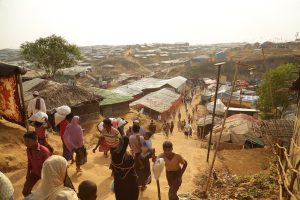Several thousand Rohingya refugees yesterday staged protests against their relocation to a remote and low-lying island in the Bay of Bengal, as senior United Nations officials paid a visit to the island.
According to one report citing local police sources, the protest involved up to 4,000 people and coincided with an inspection visit by high-ranking officials from the United Nations High Commissioner for refugees (UNHCR).
“The Rohingya who are there became unruly the moment the UNHCR representatives landed [on the island] by helicopter today,” local police chief Alamgir Hossain told the AFP news agency. “They broke the glass on warehouses by throwing rocks. They came at the police… Their demand is they don’t want to live here.”
An international rights activist said police used batons to disperse the protesters, causing several injuries, something that the Bangladeshi authorities deny. In a statement issued last night, UNHCR said that it was “deeply concerned to learn of reports of refugees who have been injured during today’s events on the island. We regret that those affected reportedly include children and women.”
Bangladesh is home to more than 1 million Rohingya Muslims, most of whom were forced over the border by fierce assaults by Myanmar’s military in 2016 and 2017. U.N. investigators later claimed the military showed “genocidal intent” against the Rohingya.
In a bid to reduce the pressure on the refugee camps around Cox’s Bazar, Dhaka began moving people to Bhasan Char, a previously uninhabited island around 34 kilometers offshore, in December. Some 18,500 Rohingya refugees have since been relocated to the island, and the Office of the Refugee Relief and Repatriation Commissioner has announced that the island camp will eventually house 100,000 refugees, at a reported cost to Bangladesh of $300 million.
The relocation plan has prompted concerns about the remoteness of the island, and its vulnerability to the cyclones that frequently rage across the Bay of Bengal. In April, following its first visit to the site, UNHCR urged Bangladesh to slow down its relocation of Rohingya refugees to Bhasan Char until measures to protect residents from storms and flooding are fully in place.
At the time of the first transfers in December, rights groups also alleged that people had been coerced into moving to Bhasan Char. Last week, the U.S.-based NGO Refugees International published a report stating that the island relocation plan “reflects the shift toward a policy more akin to detention than refuge.” It added that there remained “serious questions… about the informed and voluntary nature of the relocations,” and claimed that people had been promised Bangladeshi citizenship and other inducements to undertake the move.
“In recent weeks, Refugees International has received credible reports that camp officials have falsely promised payments and Bangladeshi citizenship to the Rohingya who relocate to the island,” the report stated. “Other refugees report ‘volunteering’ to be relocated only after being offered amnesty from pending criminal charges.”
The Bangladeshi government strenuously denied the reports, claiming that its ultimate goal was the repatriation of Rohingya to Myanmar.
However, the chances of repatriating refugees from Cox’s Bazar, already slim prior to the Myanmar military’s seizure of power in February, appear to have vanished for the foreseeable future. Last week, in an interview with the Chinese-language Phoenix television station, junta leader Sen. Gen. Min Aung Hlaing said that such a return was unlikely, repeating the common claim that the Rohingya were illegal immigrants.
“If it doesn’t comply with Myanmar’s laws, what else is there to consider?” Min Aung Hlaing said in response to the question of whether the refugees could be allowed back to Rakhine State. “I don’t believe there is any country in the world that would go beyond their own country’s refugee laws to accept refugees.”
Between Myanmar’s continuing descent into political turmoil, and the obdurate stance of its military government, it seems likely that there will be a large Rohingya refugee presence in Bangladesh for years to come.

































